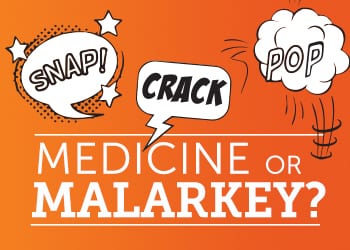Medicine or Malarkey: Does Cracking Your Knuckles Cause Arthritis?

That popping noise you hear when you crack your knuckles drives some people batty but it may sound like pure bliss to others. Parents have admonished kids for decades, “Don’t crack your knuckles! You’re going to give yourself arthritis!” This folk wisdom has been passed down for years, yet few stop to think critically about it — is it actually true?
The truth? For the most part, knuckle cracking is a harmless activity that does not increase your risk of any chronic illnesses.
What Makes Knuckles Crack?
Joints are the points of articulation between two bones. The joints of your fingers have small gaps between the bones. These gaps are filled with synovial fluid, that’s a fancy name for what lubricates the joint and prevents bones from grinding on one another.
When you “crack” a joint, you perform a movement that increases the amount of space between the bones. This suddenly expanded space creates negative pressure, and synovial fluid rushes into the area to fill the negative pressure void. The popping or cracking sound you hear is actually the sound of that synovial fluid rushing into the space between your bones.
Cracking Knuckles is NOT Associated with Arthritis Risk
So if cracking knuckles is caused by synovial fluid rushing into the joint, can that have an impact on your risk for arthritis? Contrary to many people’s fears, the science suggests that no — it is not.
Several large clinical studies have examined patients with osteoarthritis — a.k.a. “wear and tear” arthritis, the most common form — to determine how many of them are “knuckle crackers.” Scientists have found no evidence to suggest that people who crack their knuckles have higher rates of arthritis or other bone conditions than those who do not crack their knuckles. In fact, one man used himself as a test case, cracking only the joints on his left hand but not his right. Believe it or not, after more than 60 years of doing this, there was no difference in arthritis between the two hands.
Of course, cracking a joint does cause the the material holding the joint and surrounding connective tissue to stretch. Over time, repeated joint cracking can loosen the tissue. This makes it easier to crack the joints — and that’s why knuckle crackers have joints that are particularly susceptible to popping. However, this appears to be a harmless side effect of knuckle cracking. Loosened connected tissue as a result of frequent knuckle cracking has not been associated with disease.
When to Be Concerned about Cracking Joints
Cracking your knuckles should not be a source of pain or discomfort. If you do experience frequent joint cracking accompanied by pain, that could be a sign of more serious underlying problems. For example, some patients with bursitis, arthritis or tendinitis find that their joints crack more often. If you do notice that your joints crack more often and cause you pain, make an appointment with your health care provider today to determine the cause.
